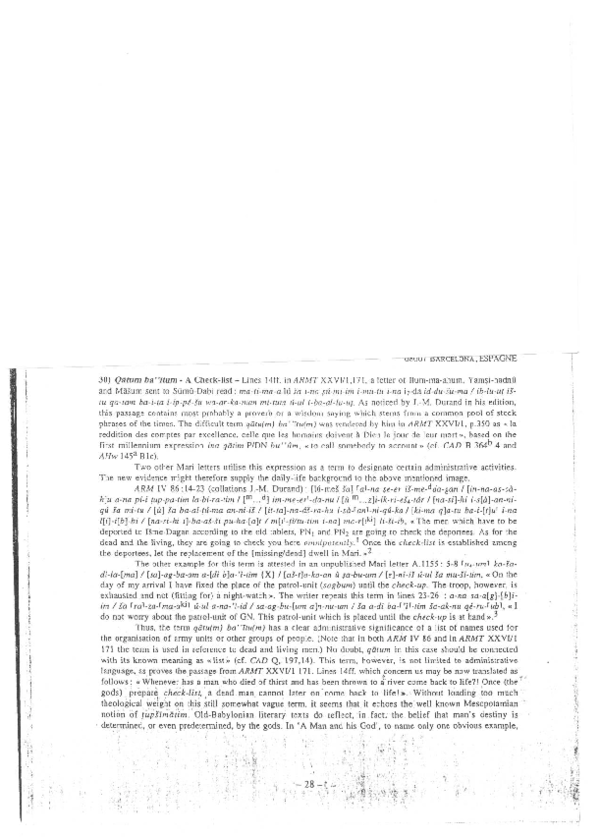Academia.edu no longer supports Internet Explorer.
To browse Academia.edu and the wider internet faster and more securely, please take a few seconds to upgrade your browser.
Qatum ba"itum - A Check-list, 1994
Qatum ba"itum - A Check-list, 1994
Related Papers
2014 •
This paper reconsiders the evidence for the role played by the Mycenaean officials called e-qe-ta (possibly /hekwetās/ “Followers”) in Linear B texts. They were officials of high rank, with tasks certainly in the military sphere and probably in the religious. Some scholars have also suggested that they were involved in craft productions directly controlled by the central administration, namely cloth and chariot industries. This latter hypothesis is here questioned. Among the Linear B tablets analyzed within this scope, particular attention is devoted to two tablets from Knossos. The first, As <4493.1>, is a list of personnel called e-pi-ko-wo and assigned to an e-qe-ta. The term e-pi-ko-wo is difficult to understand and it is discussed here because one of the interpretations previously suggested is “allies, auxiliaries troops”. In the second tablet, Am(2) 821.1, two e-qe-ta are recorded e-ne-ka e-mi-to. This syntagma should correspond to alphabetical Greek emmisthōn eneka "because / on account of the hired". So far such "hired people" have been thought to be hired workers, i.e. artisans. Nevertheless, this study shows that no reliable evidence does exist for the role of the e-qe-ta as supervisors of artisans. Therefore, on the ground of the certain military role of the e-qe-ta, it is here suggested that the e-mi-to/emmisthoi were people paid, or at least rewarded to fight under the orders of the e-qe-ta. In other words, the emmisthoi might have been professional warriors provided and controlled by the military officials called e-qe-ta.
2010 •
The Journal of Juristic Papyrology
Nubica onomastica miscellanea V: Reedition of two Old Nubian lists of names from Qasr Ibrim2020 •
Unlike previous instalments of the ‘Nubica onomastica miscellanea’-series which focused on correcting single names or phrases in Nubian texts, its fifth part brings the complete reedition of two more substantial texts originally published by Giovanni Ruffini. The former is a list of witnesses to a deed of land sale (P. Qasr Ibrim IV 65) and the latter an account (P. Qasr Ibrim IV 80). While the main subject of the paper are personal names that can be found in the two documents, other elements, such as grammar, lexicon, and – especially for P. Qasr Ibrim IV 80 – the matter of the document are also duly treated. By identifying ghost-names in Ruffini’s edition and proposing the identification of new Old Nubian substantives, the paper enhances our knowledge about the vocabulary of the language. Last but not least, the new interpretation of P. Qasr Ibrim IV 80, which – for the first time in medieval Nubia – appears to explicitly state the value of certain commodities in dirhams, is an important contribution to the studies on the monetisation of Nubian economy.
The Oriental Institute 2003–2004 Annual Report
Quseir al-Qadim2004 •
Preliminary discussion of 13th century business letters addressed to a father and son, or to their joint warehouse, and their relationship to the archaeology of a domestic-mercantile compound consisting of two living units and a row of storerooms. Each man's home can provisionally be identified.
RELATED PAPERS
Annales de la Société royale d'archéologie de Bruxelles, 79
Le "Couronnement de Marie d'Oignies", un tableau perdu de Gaspar de Crayer (1642) commenté par Daniel Papebroch2023 •
2012 •
Estudos germânicos
O ensino da língua instrumental: o inglês, o alemão e o francês1982 •
Visual Resources
Stars, Knots, Dragons and Royal Weddings: Badges of the Houses of Braganza and Savoy in a Nineteenth-Century Portuguese Royal Palace2018 •
1970 •
Chinese Journal of Physics
Effects of thermal radiation, viscous and Joule heating on electrical MHD nanofluid with double stratification2017 •
2020 •
Marges, Els: revista de llengua i …
Factors i dependències en la cultura1998 •
Call girls Surat
Surat Escorts | 💯Call Us ☎️ +91-9600000000 🔝💃 | 😍 Surat Call Girls available at Affordable price Book Now 😍2012 •
Production Planning & Control
Optimum resource determination for project scheduling2024 •
medRxiv (Cold Spring Harbor Laboratory)
Assessment of Technical Efficiency in the Moroccan Public Hospital Network: Using the DEA Method2024 •
RELATED TOPICS
- Find new research papers in:
- Physics
- Chemistry
- Biology
- Health Sciences
- Ecology
- Earth Sciences
- Cognitive Science
- Mathematics
- Computer Science

 Nathan Wasserman
Nathan Wasserman